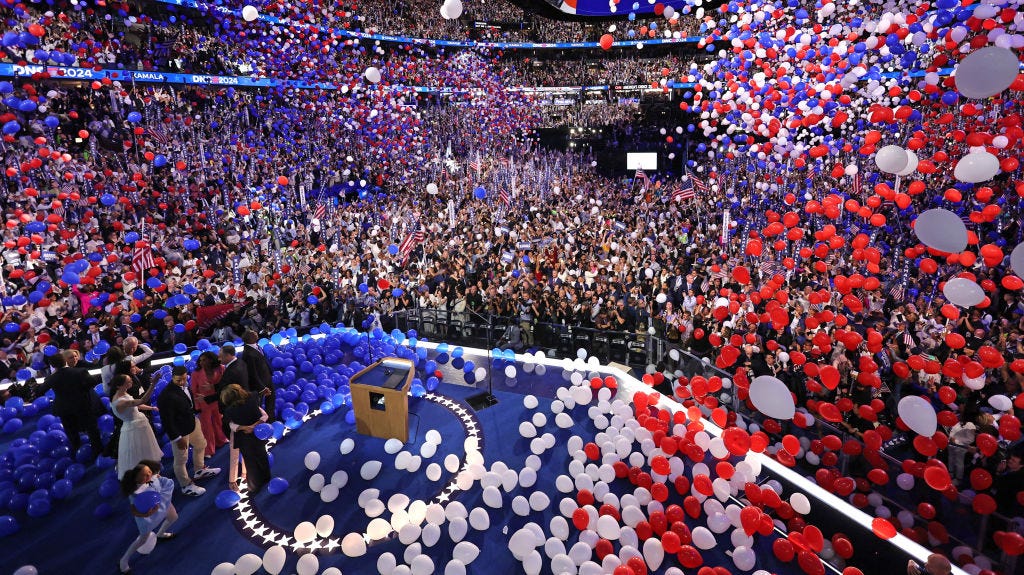DNC diary, the big party in Chicago, the brat pack rises: Weekend reads for August 24, 2024
Some links worth your time this weekend
In Chicago, the Democratic Party did something we’ve been hoping to see all year: in a series of blistering, empathetic, and mostly pitch-perfect speeches, Democratic luminaries claimed core American values and took the fight to the Republicans, defining them as not just weird or creepy, but as the enemies of those values. It’s not just a vibe shift — it amounts to a whole new Democratic party, one that finally understands how to throw the better party.
Anand was on the ground all week at the Democratic National Convention, and at The Ink, we’ve been bringing you his daily dispatches, not just from the floor speeches and the incredible, emotional performance Kamala Harris and the Party put on as they formally introduced Harris and Tim Walz’s candidacy to the nation, but on the behind-the-scenes work done, from the organizers, activists, and other grassroots folks building the future from the ground up to the artists and communicators shaping the message and on to the influencers, content creators, and journalists taking that message to the world.
As you look forward to November, we invite you to begin by looking back on the week that was.
And, in this week’s readings — the links we pull together for our paid subscribers each weekend — we’ve collected some articles from others on their convention reflections, plus a host of pieces on happenings elsewhere in the worlds of politics, culture, and science for your entertainment and edification.
A request for those who haven’t yet joined us: The interviews and essays that we share here take research and editing and much more. We work hard, and we are eager to bring on more writers, more voices. But we need your help to keep this going. Join us today to support the kind of independent media you want to exist.
In case you missed it
Anand was on the ground in Chicago this week, and what he found at the Democratic National Convention was the culmination of a long internal struggle that’s transformed the Democratic Party into something really new.
My best, most distilled understanding of what has happened in the transition to a Kamala Harris campaign is that the civil war has turned. Harris may have inherited much of Biden’s campaign apparatus and its players, but many at the top are new — Harris’s people. And in the giant threadbare temporary startup that is a presidential campaign, the faction that long wanted a different, fresher way seems to be winning.
The Ink’s DNC reporting got off to a shaky start (bad weather foiled many flight plans), but that left us some time to reflect on the sea change in Democratic thinking — and storytelling.
When you watch the new ad, you see something really important developing: a progressive Americanness, a progressive patriotism, a story of the country that is neither in denial about America’s history and present problems nor blind to what makes it good, even unique in the world. There is also a sense of motion. This is a country that likes to build, create, hustle, do. It has been waylaid by ridiculous politics and leaders who are more interested in policing whether or not people have children and cats than helping people. But I found the ad impressive because it wove so many of these storylines together: freedom, patriotism, American hustle-bustle over American carnage.
A political convention isn’t just the show we all see on stage — there are a hugh number of smaller events taking place around it, as activists and strategists gather to figure out how to build on the energy of the main event. Anand got a glimpse of the “private convention” behind the public one, and reported back on the folks doing the on-the-ground work of politics.
When the panel got under way, here is what struck me most. Multiple speakers made the case for what I would call an expansionary progressivism. They seemed obliquely to be pushing against some in their own movements who issue purity tests that make coalition building harder. But they also pushed against a Democratic habit of courting moderates at the expense of standing for anything.
All year, we’ve been talking (often with messaging guru Anat Shenker-Osorio) about how Democrats have needed to figure out how to throw the better (small-p) party. And what Anand found at the Democratic National Convention was just that — a joyful, exhilarating, all-caps PARTY that invites everyone to a better tomorrow.
Cut to the very long roll call from last night — a normally tedious exercise — which for the first time in my memory, was truly engaging and exciting and even a little weird and edgy at times. Somewhere between the halcyon days of Kamala being deemed “brat” and Lil Jon’s answering the call for Georgia, it struck me that the Democrats have somehow managed to reclaim fun in the span of a few short weeks.
What the convention means
Democrats: the next generation
Another way to frame the difference is that the RNC took place only in the present, while the DNC contained both the past and future of the party. At the RNC, the traditional convention invocation of the party’s heritage was at a minimum: scarce references to Abraham Lincoln, Theodore Roosevelt—or even Ronald Reagan. All that mattered was Trump. Even the living Republican nominees for president (George W. Bush and Mitt Romney) were excluded from the RNC. [The Nation]
How the pundits lost the plot
…we need to acknowledge that the media are conservative in the most traditional, unideological sense of the word: They are clinging to a status quo, their status quo, that has not matched our reality since Barack Obama was elected president in 2008 and the Tea Party emerged as the energized manifestation of Ronald Reagan’s 1980s fever dreams. Their rules, their conventional wisdom, their savvy takes become more stale, more detached from normal life, and more cartoonish with every passing day. [The New Republic]
What is weird?
Regardless of its potential electoral effects, however, the Democratic “You are weird” offensive marks a significant moment. First of all, it crystallizes the key question that has in many ways defined a central fault line in American politics: Who gets to decide what is “normal” – and therefore: acceptable – in America? [Democracy Americana]
Uncommitted’s commitment
The Palestinian rights movement needs to increase its influence and power in the Democratic Party. One way this could happen is if center-left Jewish, pro-Israel organizations begin to shift on this issue in a significant way, which I’m fairly pessimistic about based on the way that J Street and the Jewish Democratic Council of America have aligned with AIPAC or stayed neutral in these primary races. Otherwise, progressive, young, and Arab and Muslim Democrats, have to provide some sort of infrastructure that can match the level of influence that pro-Israel organizations have. The third possibility—and this is the theory that I’m the most skeptical about—is that if the Democrats lose due to a margin that you could say is because of the Gaza war, the party would fundamentally rethink its approach to Israel/Palestine. [Dissent]
Do conventions even matter?
Political conventions used to be the place where party faithfuls choose their nominee. But no longer. So why do we continue the tradition? And what purpose do they serve? [WBEZ]
Readings
How Silicon Valley fell in love with the far right
It isn’t surprising that entrepreneurs dream of discovering the off-ramp from a world of squalid political bargains to the dizzying freedom of market choice and unlimited technological progress. Perhaps it isn’t even a shock that many are willing to embrace pro-tariff, anti-immigration Donald Trump, who promises to crush their enemies (and commute Ulbricht’s life sentence for drug trafficking while he’s at it). Like Ulbricht, they draw inspiration and justification for their dreams from political philosophy, mixing old thinkers with new machinic visions of technology devouring and transforming humanity. [American Affairs]








